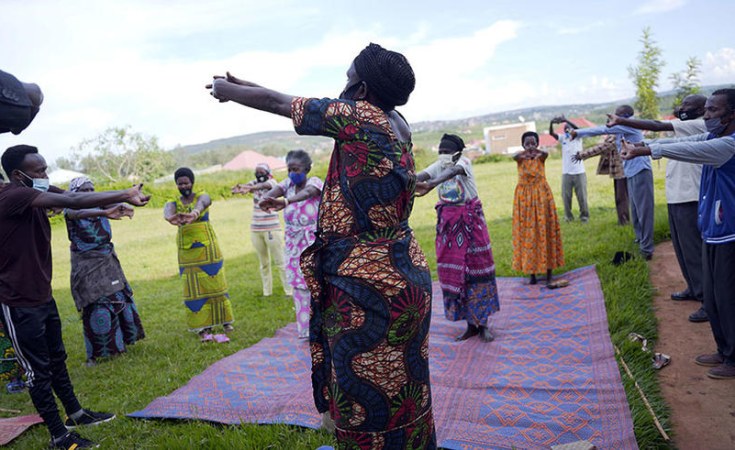Kigali — A minute of silence was observed on April 7 across Rwanda as the country held a memorial ceremony to mourn more than one million people, overwhelmingly Tutsis, who were systematically killed in the 100 days of atrocities between April and July 1994.
The Rwandan government's commemoration marking the 30th anniversary of the 1994 Rwandan genocide against Tutsi raised the curtain on a three-month remembrance period. The event was attended by current and former heads of state and government, including former US President Bill Clinton, former French President Nicolas Sarkozy, and other visiting guests who also laid wreaths at the memorial earlier Sunday, April 7.
The genocide claimed the lives of 1,074,017 people, mainly ethnic Tutsis. The killing spree began immediately after a plane carrying former Rwandan President Juvenal Habyarimana and his Burundian counterpart, Cyprien Ntaryamira, was shot down over Rwanda's capital, Kigali, on April 6, 1994.
The annual commemoration is to be held every year from April 7 to July 4, in line with the period of the genocide.
The commemoration, named Kwibuka (meaning 'remember'), started with the laying of wreaths at the Kigali Genocide Memorial, the final resting place for more than 250,000 victims of the genocide, followed by a commemoration ceremony.
Marie Louise Ayinkamiye, a genocide survivor who was 11 years old during the genocide and lived in Nyange village in western Rwanda. She said that the impact of genocide continues long after the killing has ended. Survivors are now tapping into their inner resilience and facing life's challenges with courage and determination.
"My oldest son is the same age as I was during the genocide... I was born and grew up experiencing discrimination because of my ethnicity. Now 30 years on, life in Rwanda looks very different," the mother of five told the mourners at Kigali Arena
As Rwanda marks the 30th anniversary of the Genocide, authorities emphasize the need to provide survivors with strategies to help them navigate their healing journey, build resilience, and recreate a better future for the children and generations to come.
Rwandan President Paul Kagame told hundreds of people, including senior officials and senior delegations from several countries who turned out to observe the ceremony, that only a new generation of young people has the ability to renew and redeem a nation after a genocide.
"Our job was to provide the space and the tools for them to break the cycle (...) and they have," Kagame said.
Official estimates show that about 78 percent of Rwandans are below 35 years of age. The majority either have no memory of the genocide or were not yet born
"Our youth are the guardians of our future and the foundation of our unity, with a mindset that is totally different from the generation before," Kagame said.
The latest Rwanda Reconciliation Barometer, published by the government, shows that the status of reconciliation in Rwanda moved from 82.3 percent in 2010 to 92.5 percent in 2015 and to 94.7 percent in 2020.
Another factor the reconciliation barometers presented as hindering reconciliation was the fact that some Rwandans still viewed themselves and others through ethnic lenses.
Rwandans, according to the official report, feel attached to their national identity, which would make reconciliation highly possible, as it would mean that they have overcome tendencies to associate themselves and others with ethnic-specific identities.
However, many respondents to the survey confessed that if people were not careful, the genocide ideology could continue to be disseminated among the youth and create an environment for a genocide to happen again.
According to the latest findings by the former government's National Unity and Reconciliation Commission, some of these people with "genocide ideology" know the government does not support such divisive practices; they hide their feelings but still live a divided life, which is why all actors have to continue engaging more with unity and reconciliation.
The Rwandan president observed that it was all Rwandans who had conquered fear.
"Nothing can be worse than what we have already experienced. This is a nation of 14 million people who are ready to confront any attempt to take us backwards," the Rwandan leader said.
The latest estimates by Never Again Rwanda, one of the local non-governmental organizations working to build trust and promote trauma healing and genocide prevention, show that social mistrust, suspicion, and fears stemming from wounds directly and indirectly related to the genocide against the Tutsi in Rwanda remain.
The organization notes that though Rwanda has achieved significant development gains and stability since the genocide, efforts towards long-term sustainable peace must be sensitive to the presence of trauma within Rwandan society and seek to redress it.
The 2018 Rwanda's comprehensive mental-health survey, conducted by the Rwanda Biomedical Centre (RBC) shows that about 28% of genocide survivors reported post-traumatic stress disorder (PTSD) symptoms, compared with 3.6% of the general population.
IPS UN Bureau Report


